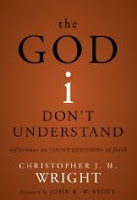 Book Review: The God I Don’t Understand by Christopher J H Wright (Zondervan: Grand Rapids, 2008)
Book Review: The God I Don’t Understand by Christopher J H Wright (Zondervan: Grand Rapids, 2008)I wholeheartedly recommend Dr Christopher Wright’s The God I Don’t Understand to everyone. Christopher Wright is a respected scholar in the Old Testament, and was formerly the principal of All Nations Christian College, a leading mission training college in England. Currently he is the Director of Langham Partnership International, and the chair of the Theological Resource Panel of TEAR Fund, UK.
The God I Don’t Understand is easy-to-read, honest, and full of insights. It seeks to answer four questions:
• What about evil and suffering?
• What about the Canaanites? (That is, how come such violence can be found in the bible?)
• What about the cross?
• What about the end of the world?
Christopher Wright deals with the problem of evil and suffering skilfully. He is gentle, biblical and not dogmatic. He insightfully says that while we often ask ‘why?,’ the people in the bible more often ask ‘how long’. This is so true!
The theology of the cross is both simple and complicated. On the one hand it is simply about the death and resurrection of Christ, which is, in turn, the foundation of the gospel. On the other hand the mechanics of how it works can be hard to understand. But Wright manages to explain it in three user-friendly chapters, covering some rather controversial questions. Is the cross an expression of God’s love or anger, or both? Should sin be understood in terms of ‘personal and objective guilt’? Or is it concerning ‘subjective and social shame’ in a given cultural context? Interesting and important questions for 21st-century Christians in a pluralistic world, and Wright provides us with good answers.
He honestly says that there are a lot of things in the scripture that he doesn’t understand – hence the title of the book. But what he does understand he explains clearly, helpfully and in a simple language. He does this exceptionally well in the three chapters about the end of the world under the titles ‘Cranks and Controversies’, ‘The Great Climax’, and ‘The New Beginning’.
Often I find that authors on these topics tend to write from their own doctrinal and ideological perspectives. But for Wright, it’s primarily scriptural. I particularly like his humility. He does not shy from affirming biblical truths, but at the same time he does not claim to have all the answers.
The book has clarified plenty of questions for me. But it is not a book of deep theology. Instead, it contains lucid bible teaching that has huge implications to how we live today. We are indebted to this fine book for its contribution to the church.

